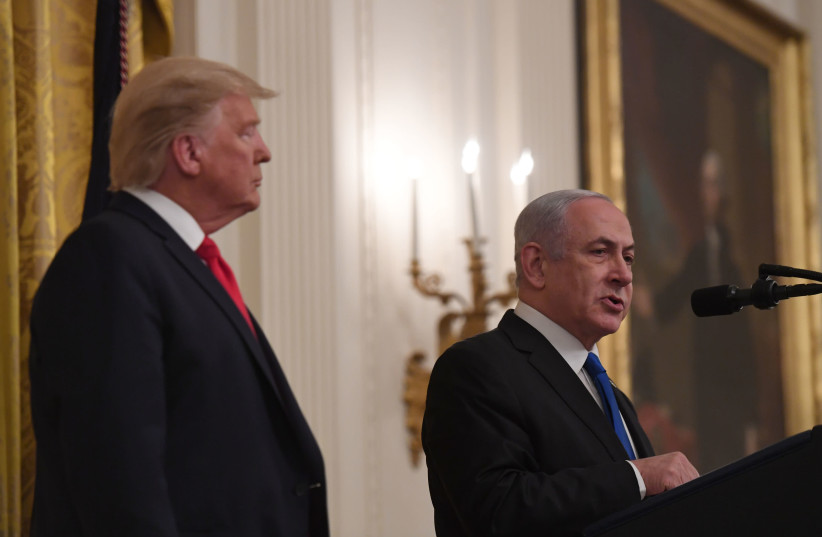Likud voters in Judea and Samaria are a relatively small yet influential group, and Netanyahu is left doing damage control and repeating over and over that annexation will really happen.

That Jerusalem and Washington have no daylight between them is something both sides have been saying. It is important to both the Trump administration and the Netanyahu government to emphasize they are in sync with one another.
The reason they keep having to say that is because it sure looked like there was daylight recently.
Right after US President Donald Trump presented his peace plan almost two weeks ago, Prime Minister Benjamin Netanyahu said Israel would annex the settlements within a matter of days.
Then, mere hours later, special adviser to the president Jared Kushner more or less said, “not so fast.”
It was all a miscommunication, the sides say. One American source even pinpointed the last conversation between his office and Netanyahu’s before Trump’s speech presenting the plan as the time when the misunderstanding happened, saying they should have spoken again to coordinate further.
Now, Netanyahu and Kushner and US Ambassador David Friedman are all saying the same thing, which is that they need to turn the American “conceptual map” into a far more detailed map, and that it will take time for a joint US-Israel committee to do so.
“A little bit of patience to go through a process, and to do it right is not too much to ask for,” Friedman said on Sunday.
“We’ve been waiting since 1967, and people are making a big deal over a few weeks. It will happen,” Netanyahu said at a Likud event in Ma’aleh Adumim on Saturday night.
The problem is that – as coordinated as the sides seem to be – there is this pesky March 2 election. With each consecutive election cycle that goes by, it becomes more of a fight for Netanyahu’s political life, and he has to do something to save himself and stay in office.
It is hard to find another explanation for why Netanyahu let himself get so far away from the US messaging, which yes, talked about immediate annexation but included a committee. Trump’s speech mentioned the committee, too. Yet, Netanyahu said what he said, building unrealistic expectations for those who support annexation, which then came crashing down.
Settler leaders like Yesha Council head David Elhayani read Netanyahu the riot act. Protests calling for “sovereignty” cropped up. Defense Minister Naftali Bennett’s Yamina Party began campaigning on calling for annexation now and pointing out the fact that by agreeing to the Trump plan, the prime minister is agreeing to a potential Palestinian state.
Likud voters in Judea and Samaria are a relatively small yet influential group, and Netanyahu is left doing damage control and repeating over and over that annexation will really happen even if it is not this week.
Friedman referred to these political pressures on Sunday in his remarks. He said he was concerned the Israeli “cabinet was to be pushed in the direction that was potentially adverse to our view of the process,” which is why he tweeted: “Any unilateral action in advance of the completion of the [mapping] committee process endangers the plan and American recognition.”
In this way, the ambassador was providing support for Netanyahu’s argument that the Americans are insisting Israel wait by, well, insisting Israel wait.
But there is a reason these politicians and activists to Netanyahu’s right don’t want to wait, and it is not just because it has been decades and they are impatient.
It’s because – and this is something Netanyahu himself has said – it is unclear if Blue and White leader Benny Gantz actually supports the annexation part of the Trump plan. If anything, it seems like Gantz outright opposes it. His position has been that annexation must be done in coordination with the international community, and, well, the international community other than the US clearly opposes annexation.
That makes annexation an urgent matter for before the election for those who want it, because – while the polls show yet another stalemate – there is a realistic possibility that Netanyahu won’t win. The Trump plan has not given him any kind of electoral bump, and Likud and Blue and White are still neck and neck.
So even though the US message – echoed by Netanyahu – could not be any clearer at this point, it does not look like the pressure to make an immediate move will die down before the election in three weeks.
There may not be daylight between Trump and Netanyahu, but they are still working in different time zones, and in Israel, the sun could be setting on the chance to annex.
As reported by The Jerusalem Post
